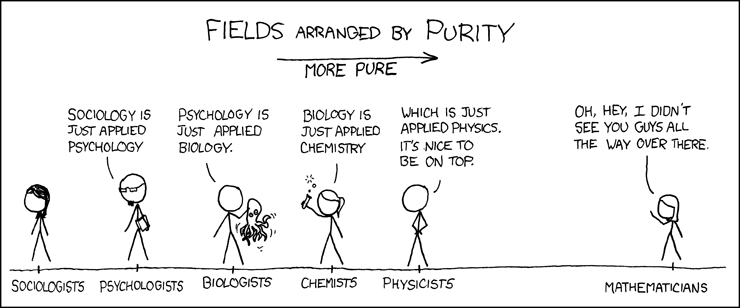Tamske
Writing...
- Joined
- Oct 22, 2009
- Messages
- 1,764
- MBTI Type
- ENTP
This thread is a reaction on the "MBTI is not scientific anyway" these I've encountered more than once.
So, when is a theory "scientific"? I'll start with a cartoon:

Of course, math is purest. It's a very beautiful field full of the abstract ideas we NeTi users love . There is a flip side to the coin of purity: math doesn't describe the outside reality. For that, you have to contaminate the perfect abstract-idea world with observations. I'm a physicist. Physics is a description of reality - and you need to distinguish between description and law or morality. (It's in our nature to be racistic, but that observation doesn't mean I approve racism. Just to be clear: I don't.)
. There is a flip side to the coin of purity: math doesn't describe the outside reality. For that, you have to contaminate the perfect abstract-idea world with observations. I'm a physicist. Physics is a description of reality - and you need to distinguish between description and law or morality. (It's in our nature to be racistic, but that observation doesn't mean I approve racism. Just to be clear: I don't.)
Now about MBTI.
There are differences between people. People have different characters. I want a language to describe them. I want to group them. I want to seek some patterns. If you do some statistics, you'll find nice Bell curves for all the dichotomies. Bell curves. Not peaks. That means the dichotomies do describe differences.
Perhaps you'll find Bell curves for any dichotomy you can devise. But we're dealing with humans here. I don't think you can do anything better than this.
But even while you can't find hard-and-fast laws ("All ESFPs are dumb" isn't true while "All electrons are repulsed by each other" is.), it's a consistent theory and it does describe reality.
You've got to know the limits of the theory, of course. But even physics has its limits. In superconducting metals, electrons travel in twosomes.
Edit: to credit the creator of that nice cartoon. Randall Munroe - see more on xkcd: Campfire.
So, when is a theory "scientific"? I'll start with a cartoon:

Of course, math is purest. It's a very beautiful field full of the abstract ideas we NeTi users love
 . There is a flip side to the coin of purity: math doesn't describe the outside reality. For that, you have to contaminate the perfect abstract-idea world with observations. I'm a physicist. Physics is a description of reality - and you need to distinguish between description and law or morality. (It's in our nature to be racistic, but that observation doesn't mean I approve racism. Just to be clear: I don't.)
. There is a flip side to the coin of purity: math doesn't describe the outside reality. For that, you have to contaminate the perfect abstract-idea world with observations. I'm a physicist. Physics is a description of reality - and you need to distinguish between description and law or morality. (It's in our nature to be racistic, but that observation doesn't mean I approve racism. Just to be clear: I don't.)Now about MBTI.
There are differences between people. People have different characters. I want a language to describe them. I want to group them. I want to seek some patterns. If you do some statistics, you'll find nice Bell curves for all the dichotomies. Bell curves. Not peaks. That means the dichotomies do describe differences.
Perhaps you'll find Bell curves for any dichotomy you can devise. But we're dealing with humans here. I don't think you can do anything better than this.
But even while you can't find hard-and-fast laws ("All ESFPs are dumb" isn't true while "All electrons are repulsed by each other" is.), it's a consistent theory and it does describe reality.
You've got to know the limits of the theory, of course. But even physics has its limits. In superconducting metals, electrons travel in twosomes.
Edit: to credit the creator of that nice cartoon. Randall Munroe - see more on xkcd: Campfire.
